Erstellt am: 9. 5. 2014 - 14:03 Uhr
Those Stinking Towns and Foul Bloody Villages
From a distance it looks like the prosperous farmers of Flanders have cultivated an ivory coloured crop. There are squares of white among the brown, yellow and green fields of the Belgian spring.
These are the First World War graveyards that dot the landscape around the Belgian town of Ypres, where, for four years, men fought ferociously to swap possession of a few square kilometres of mud.
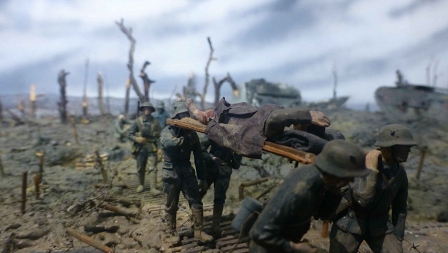
chris cummins
These were the "doomed youth" who were lamented by the poet Wilfried Owen – a whole generation was killed or maimed and historians are still struggling to find a plausible reason for this unprecedented sacrifice.
"The cemeteries have become part of the landscape here," says Jacques Ryckebosch, a hearty local who is showing me around the sites of the war that ripped Europe apart a century ago, "and we respect them as such."
250,000 British and Commonwealth soldiers lost their lives in this small square of Flanders. Men from New Zealand and western Canada died beside comrades from northern England and from the plains of India and the mountains of Pakistan. German losses were similar. The scale of the disaster defies comprehension.
"It would be a crime to forget what happened to these people," says Jacques. "I have been studying this war since I was 13. I’m now 60 and am stilled shocked at things I find out. You simply can’t imagine what these guys went through."
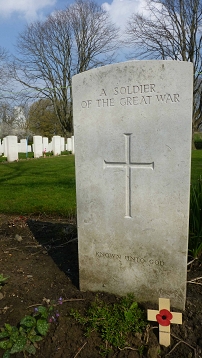
chris cummins
In Flanders people are confronted with the war every single day, says Jacques. In March, two people were killed by a shell that had been lying unexploded for almost a century. Farmers find an average of 150 tonnes of First World War ammunition every year.
"How senseless is everything that can ever be written, done, or thought, when such things are possible," says the narrator Paul in Erich Maria Remarque’s All Quiet On The Western Front. "It must be all lies and of no account when the culture of a thousand years could not prevent this stream of blood being poured out."
The conflict that turned the marshy ground near the Franco-Belgian border into a vegetation-free hell of shell-holes and rubble became known as the Great War. The soldiers consoled themselves with the myth that they were fighting the "War to End all Wars". Yet in the years since the armistice was signed in 1918, the world has never seen a year without a war somewhere on the globe.
In 2014, in Eastern Europe, the sabres are rattling again. Peter Schlosser, the curator of the anti-war Flanders’ Fields museum in Ypres thinks the historical warning represented by the graveyards and memorials of the region has a powerful resonance:
"It’s a fact that many people do not learn from what has happened in the past but that does not mean that we should stop telling the story," insists Schlosser. "It can still influence a lot of people."
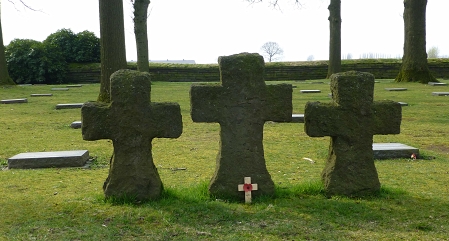
chris cummins
The graveyards usually lay where, during the fighting, one of the first aid posts known as dressing posts, were found. Here lie the soldiers that the medics had failed to save. As you get closer, the individual crosses are visible. Three thousand in one field, five thousand in the next. At Langemarck ten thousand of the German dead lie beneath slabs of sober black stone under the broody shade of oak trees. Among the professional soldiers lie a lost generation of hastily trained factory workers, farmers, clerks. "The wrong people do the fighting," complains Kropp in All Quiet On The Western Front.
I stand in front of the grave from of a boy who’d lied to the recruiters and died aged 15. In Flanders you’ll find graves of nurses who died under shell fire behind the lines while tending to sickening wounds and the grave of Canadian doctor John McCrae, whose poem "In Flanders Fields" has become an icon of grief.
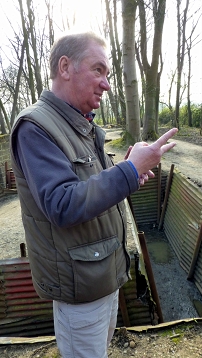
chris cummins
Most of the bodies were never found to be buried. Their bodies were presumably vaporized by shells, buried by debris or reclaimed by the wet muddy ooze that once spread each side of the viciously contested frontline. They are the "lost" and their names are now inscribed on the pale limestone walls of the Menin Gate, a giant limestone arch in Ypres. There are 54,896 names inscribed on the inside of the arch giant wall.
I note an Australian ub-altern who shared my name. I feel a strange kinship with this Lieuenant Chris Cummins and wonder what he was like and what dreams of the future he had cherished. Then I scribble down the names of a man registered as Mohammed Khan 268 who is commemorated next to a man inscribed as Mohammed Khan 333. Their loss of individuality in death emphasises the scale of the sacrifice of farmers, clerks and factory workers dragged from all over the globe to die on the fields on Belgium.
Even this giant memorial isn’t big enough. A further 34,984 names are carved on panels at the nearby Tyne Cot cemetery.
Every evening at 8pm this loss is recalled by a ceremony at the Menin Gate called the Last Post. Some nights hundreds of commemoration tourists shuffle under the echoing weight of arched stone as the hauntingly plaintive sound brass bugle cries out in the half darkness.
There was so much death here because Ypres, or Wipers as it was known to the British soldiers, held a strategic position on the route of the German advance into France. It was inside a bulge (or salient to use the military term) that had formed in the lines of opposing armies.
It made military sense for the Allied troops to give it up, because a salient means you can be shelled from three sides instead of just one. But this was an age of bloody-mindedness. In a vicious circle of sacrifice, more soldiers were needlessly killed for the honour of men who had been killed earlier in the war.
The blood-stained ground became too precious to give up and Ypres became the centre of three intense and bloody battles. So, in effect, too many people kept dying, because too many people had already died. It is the skewed logic of pride.
But we do honour them. "Think of those stinking towns and foul bloody villages whose names will be turned into some bogus glory by fat-arsed historians who have sat in London," says Captain Gray, Sebastian Faulks' First World War novel Birdsong: "We were there. As our punishment for God knows what, we were there, and our men died in each of those disgusting places. I hate their names. I hate the sound of them and the thought of them."
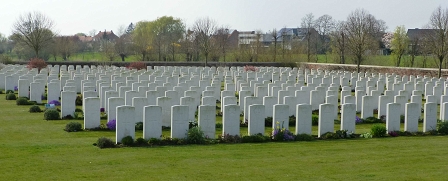
chris cummins
The next day, Jacques takes me to a hamlet called Boezinge on Pilckem Ridge where there is a memorial to the French troops who died in the world’s first experiment in chemical warfare. On the 22nd April 1915 German troops released canisters of chlorine, relying on the prevailing winds to carry the poison gas over the French troops.
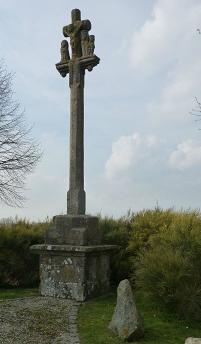
chris cummins
"At first the French troops thought the clouds meant that the German trenches were on fire. Much too late they realised they were being attacked with gas. Many died and it is a horrible death. It attacks your eyes and leaves you blind. It attacks your throat. But much worse it turns your lung tissue into liquid. You drown in your own bodily fluid."
A narrow country road, lined now with maple trees in memory of the Canadians who were killed in the area, leads to the Sanctuary Wood Museum in the backyard of which some front line trenches were preserved after war by the Schier family who own the land.
The trenches remain intact today, still surrounded by trees shattered by artillery fire and by shell-holes that fill with water during rain showers.
There are small dugouts shaped out of the mud and dank water along the duckboards. If you try hard you can begin to imagine what it might have been like to live here alongside thousands of men, boys really, freezing in the mud, plagued by rats and rot, infested with lice, living in constant fear of shell or gas attacks. What I can never imagine is the force that led them to climb out in attack, their heavy packs weighing them down as they advanced over the mud into the thunderstorm of machine gun fire and shells.
Even the survivors were victims. Jacques’ own grandfather was gassed and shot. "I will never forget his cough and the pain he suffered." Many of the veterans could never bring themselves to even speak of what they had seen. When Jacques saw on the television news that the Forces of Syrian President Bashar Al Assad had reportedly used chlorine, he says he felt like weeping: "I thought: haven’t we learned a single thing?"
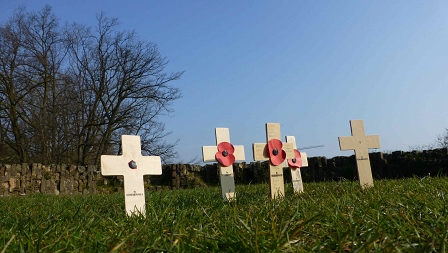
chris cummins
"Why do they never tell us that you are poor devils like us, that your mothers are just as anxious as ours, and that we have the same fear of death, and the same dying and the same agony—Forgive me, comrade; how could you be my enemy?"
― Erich Maria Remarque, All Quiet on the Western Front



